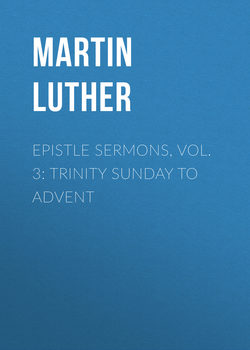Читать книгу Epistle Sermons, Vol. 3: Trinity Sunday to Advent - Martin Luther - Страница 25
Third Sunday After Trinity
THE BEAUTY OF HUMILITY
Оглавление16. Humility is one of the beautiful garments and ornaments with which Christians should adorn themselves before God and the world. Paul, in Colossians 3, 12, says, "Put on humility." He regards this virtue as more precious than all earthly crowns and splendor. This is the true spiritual life. It is not to be sought elsewhere, by running into the cloisters or the deserts, by putting on gray gown or cowl. Peter here admonishes all classes to cultivate this virtue. This sermon on good works concerns every station in every house, city or village. It is for all churches and schools. Children, servants and the youth should be humbly obedient to parents, superiors and the aged. On the other hand, it is for those in the higher stations of life who serve their inferiors, even the lowest. If all men so observed this virtue the world would be full of good works. For it is impossible that humility should do evil. It is profitable and pleasant to all men.
17. By this virtue, true saints and Christians can better be known than by monastic seclusion and holiness. It requires no great effort to wear a gray cowl. It is not even such a great trial to lie on the ground at night and to arise at midnight; scoundrels, thieves, and murderers must often do the same. But to wear and hold fast to this angelic garment, humility—this the world is not so willing to accept as monasticism and its works. And thus it comes to pass that flesh and blood do not strive after this holy life. Each man seeks an easy life, in which he can live to himself and need serve no one nor suffer anything at the hands of others; just as the monks have sought and chosen.
18. Peter adds to this admonition the reason: "For God resisteth the proud, but giveth grace to the humble." As I have said above, he strives to show the earnestness of God's command. The command is accompanied by a threat. He does not simply say, God punishes the proud, or God is hostile to them; but he "resisteth" them, he sets himself against them. Now, what is the pride of all men toward God? Not so much as a poor, empty bubble. Their pride puffs itself up and distends itself as though it would storm the sky and contend against the lightning and thunder, that can shatter heaven and earth. What can the combined might of all creatures accomplish if God oppose himself thereto? And how does a miserable man, whose heart is overwhelmed by a small pestilence, rise against the majesty of heaven which can, any moment, cast him down into the abyss? What are earth and ashes proud of? says Sirach, 10, 9.
19. Is it not enough and more than enough that other sin and disobedience are laid to our account, by which we anger God and merit heavy punishment, without our trying further to provoke him with our pride and haughtiness, so that he must arise in his majesty and resist us? With other sins he can have patience, that he may exhort and incite us to repentance. But if, in hardened impenitence, we defy and oppose him, he cannot but rise up against us. Who is there that will bear it, or be able to stand, when God sets his countenance and his power against a poor man already subject, every moment, to death and the power of the devil?
